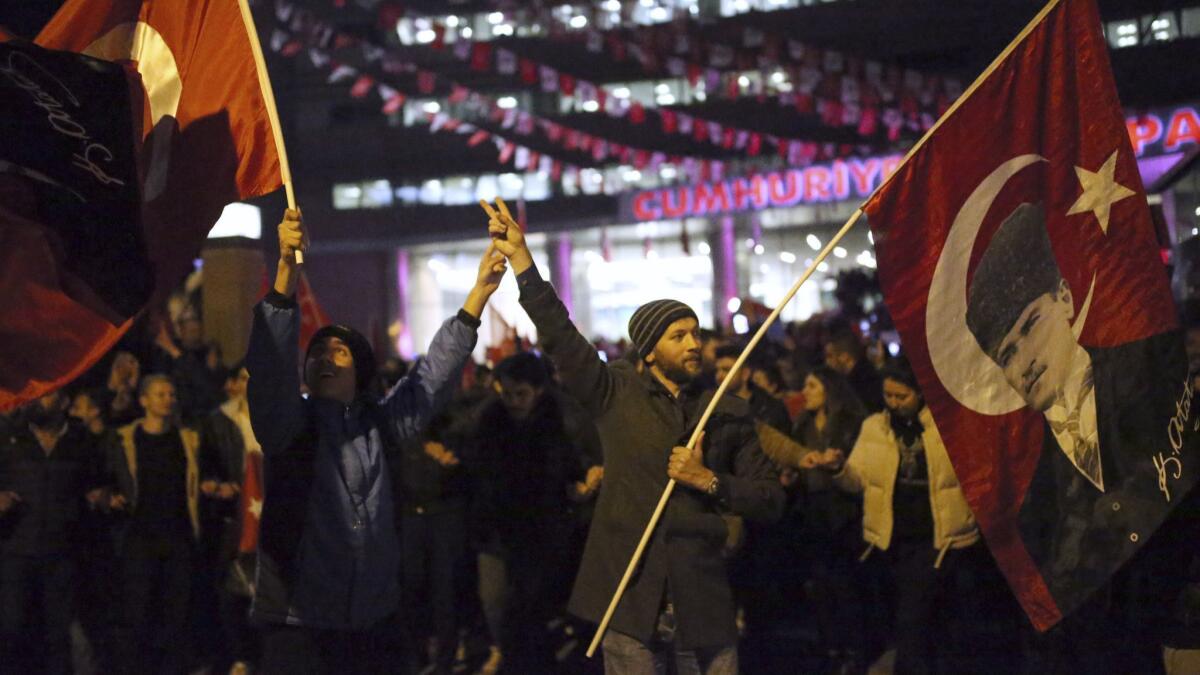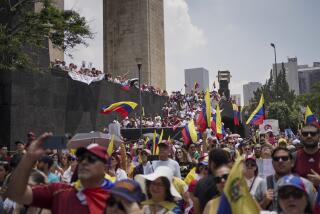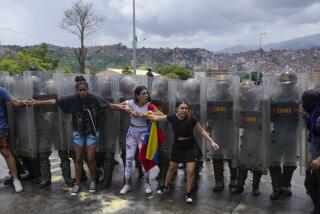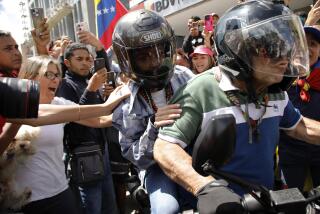President Erdogan’s party loses ground in Turkey’s two biggest cities

Reporting from Istanbul, Turkey — Turkey’s opposition looked poised to win control of the country’s two biggest cities Monday as it dealt President Recep Tayyip Erdogan’s conservative party one of its most serious electoral setbacks in years. The opposition won Ankara, a ruling-party stronghold for decades, and was leading a tight race for mayor in Istanbul, according to unofficial figures Monday.
Erdogan, who has dominated Turkish politics for 16 years, declared victory despite the opposition gains.
Sunday’s local elections were widely seen as a gauge of support for the president as the nation of 81 million faced a daunting economic recession with double-digit inflation, rising food prices and high unemployment. It was also a first test for Erdogan — who has been accused of increasingly authoritarian tendencies — since stepping last year into a new presidential role with widely expanded powers.
If confirmed, the swings in Ankara and Istanbul could be excruciating for the politician, who campaigned hard to retain hold of them. The opposition also retained its hold over Izmir, Turkey’s third-largest city.
Although Erdogan was not running for office Sunday, he became the face of the campaign, rallying tirelessly for months across Turkey, using hostile rhetoric against opposition parties and portraying the vote as a matter of national survival.
The decline in urban support for his conservative, religious-based party has come despite the fact that Erdogan wields tight control over the media, which hardly covered the opposition candidates’ campaigns.
Behlul Ozkan, an associate professor at Istanbul’s Marmara University, said Erdogan’s loss of ground in Ankara and Istanbul indicated that his socially conservative and construction-driven policies no longer resonated in Turkey’s cities.
“Political Islam’s quarter-century-old hegemony in Turkey’s two largest cities is over,” he said. “The basic problem is that Erdogan is not able to get votes from middle-income earners who believe that the economy, education and urban administration are not run well.”
Call to prayer is a daily reminder of religious and political shift in Turkey »
More than 57 million people were eligible to vote for the mayors of 30 major cities, 51 provincial capitals and 922 districts in Turkey. The election was marred by sporadic violence, with five dead and scores injured across Turkey.
Erdogan’s party and its nationalist allies garnered some 52% of the vote overall, but the opposition made momentous inroads.
A strategic decision by a pro-Kurdish party to sit out critical races in major cities contributed to the opposition’s gains. The opposition also increased its support along the Mediterranean, taking the city of Adana from the nationalists and the resort destination of Antalya from the ruling party.
Unofficial results reported by the state-run Anadolu news agency after all votes were counted showed a razor-thin win for the opposition in the race for mayor of Istanbul, Turkey’s largest city and commercial hub. The opposition vote was at 48.8% support to the ruling party’s 48.5% support.
Ekrem Imamoglu, the opposition candidate in an alliance led by the secular Republican People’s Party, or CHP, declared that he had won Istanbul. But his rival, former Prime Minister Binali Yildirim of the ruling party, said it was still too early to call.
Yildirim accepted that his rival was leading but said his party would file an objection, suggesting a recount of the 319,500 votes declared void in Istanbul.
Ankara and Istanbul have been held by Erdogan’s Justice and Development Party, or AKP, and its Islamic-oriented predecessor for 25 years. Erdogan’s own ascent to power began as Istanbul mayor in 1994.
Unofficial results showed Mansur Yavas, the candidate of the CHP-led alliance, winning the top post in Ankara with 50.9% support. The AKP still holds a majority of Ankara’s 25 districts.
The government led a hostile campaign against Yavas and his party, accusing him of forgery and tax evasion.
The AKP’s candidate for Ankara mayor, Mehmet Ozhaseki, won 47.1% support; his party said it would challenge the results.
Andrew Dawson, who heads the Council of Europe’s election observation mission, said Monday his monitors were “not fully convinced that Turkey currently has the free and fair electoral environment which is necessary for genuinely democratic elections in line with European values and principles.”
Since 2016, the government has replaced 95 elected municipal, provincial or district mayors with government-appointed trustees in a crackdown on the Peoples’ Democratic Party, or HDP, over allegations of links to outlawed Kurdish militants.
The Council of Europe acknowledged Turkey’s security concerns but said Turkey’s definition of terrorism was not consistent with European standards.
“We do not accept assertions that assume every HDP mayor is or could be a terrorist or has terrorist connections,” Dawson said.
In predominantly Kurdish provinces, the HDP won back some seats from government trustees, including the symbolic capital of Diyarbakir, but lost several former strongholds to the ruling party.
Dawson urged the Turkish government to respect the election results.
Political parties can submit their objections for three days, and official results are expected in the coming days.
More to Read
Sign up for Essential California
The most important California stories and recommendations in your inbox every morning.
You may occasionally receive promotional content from the Los Angeles Times.










